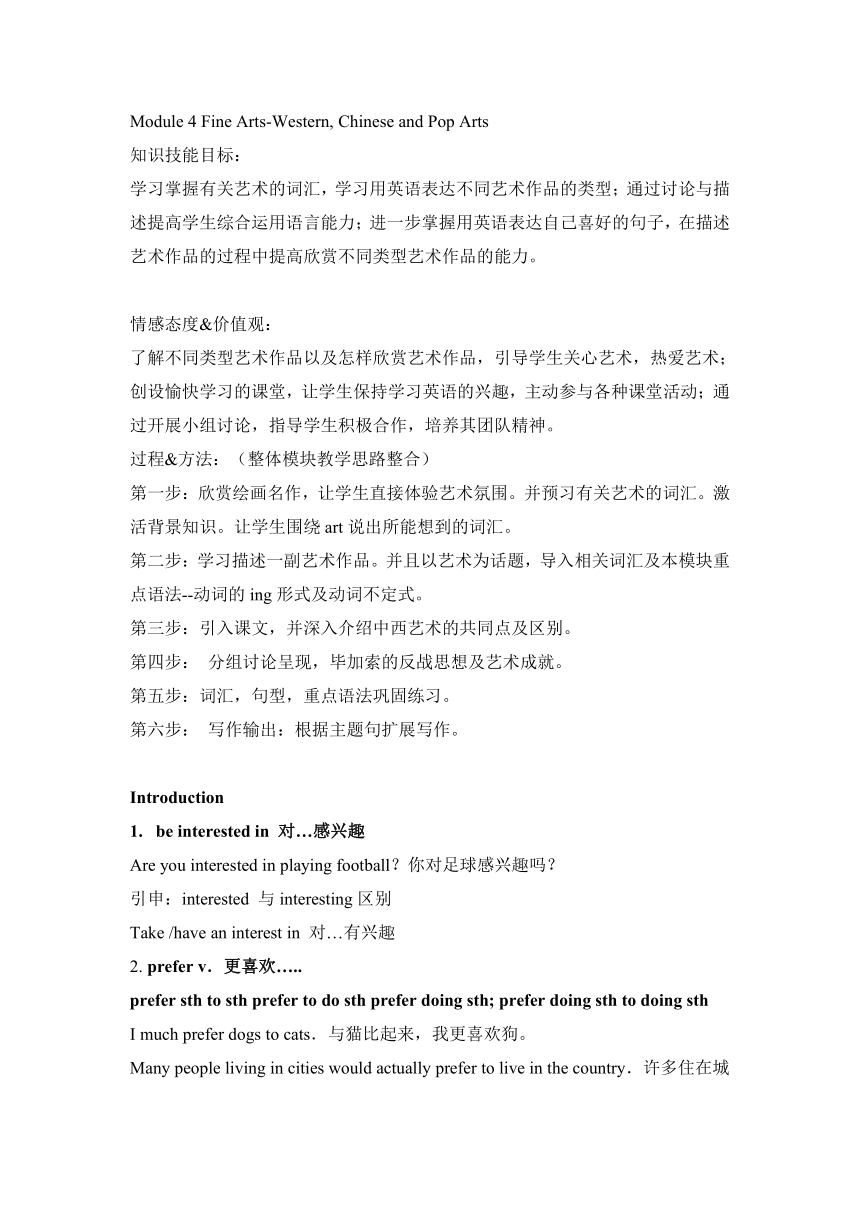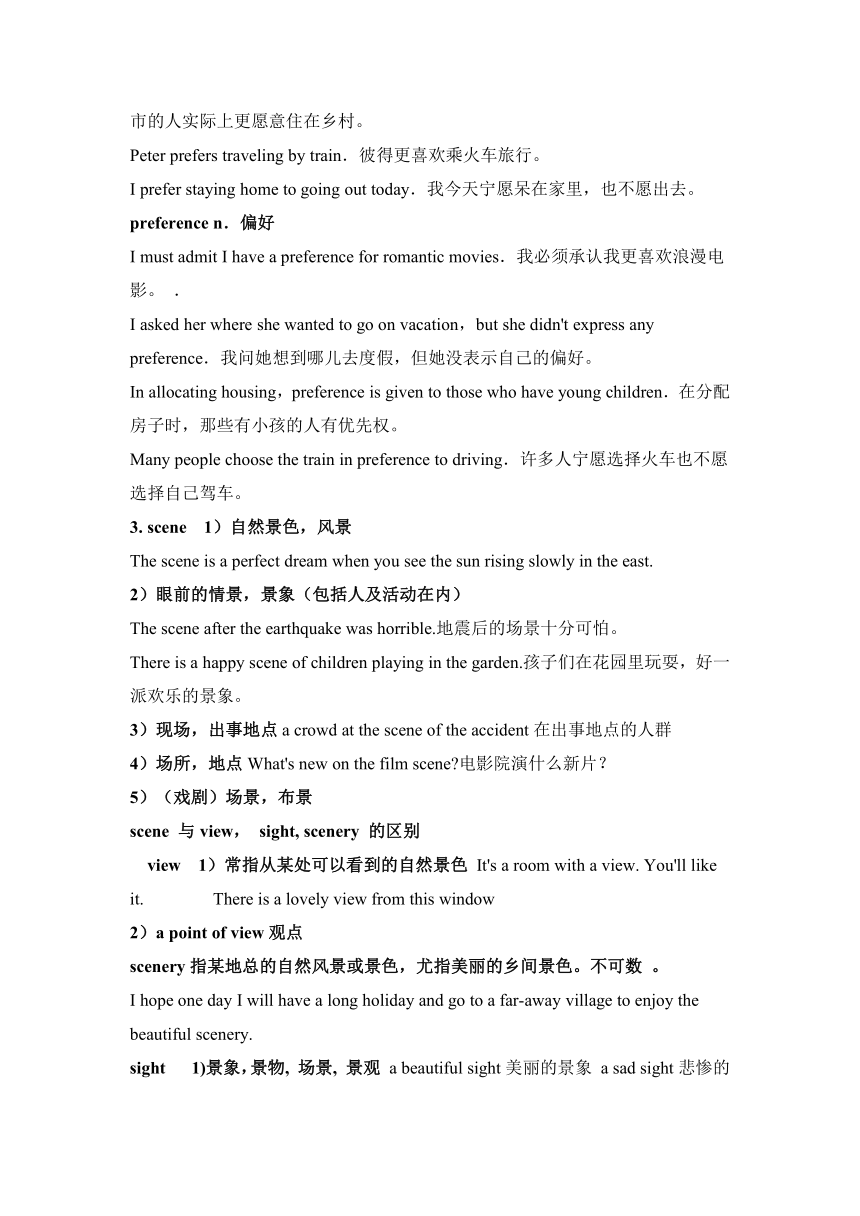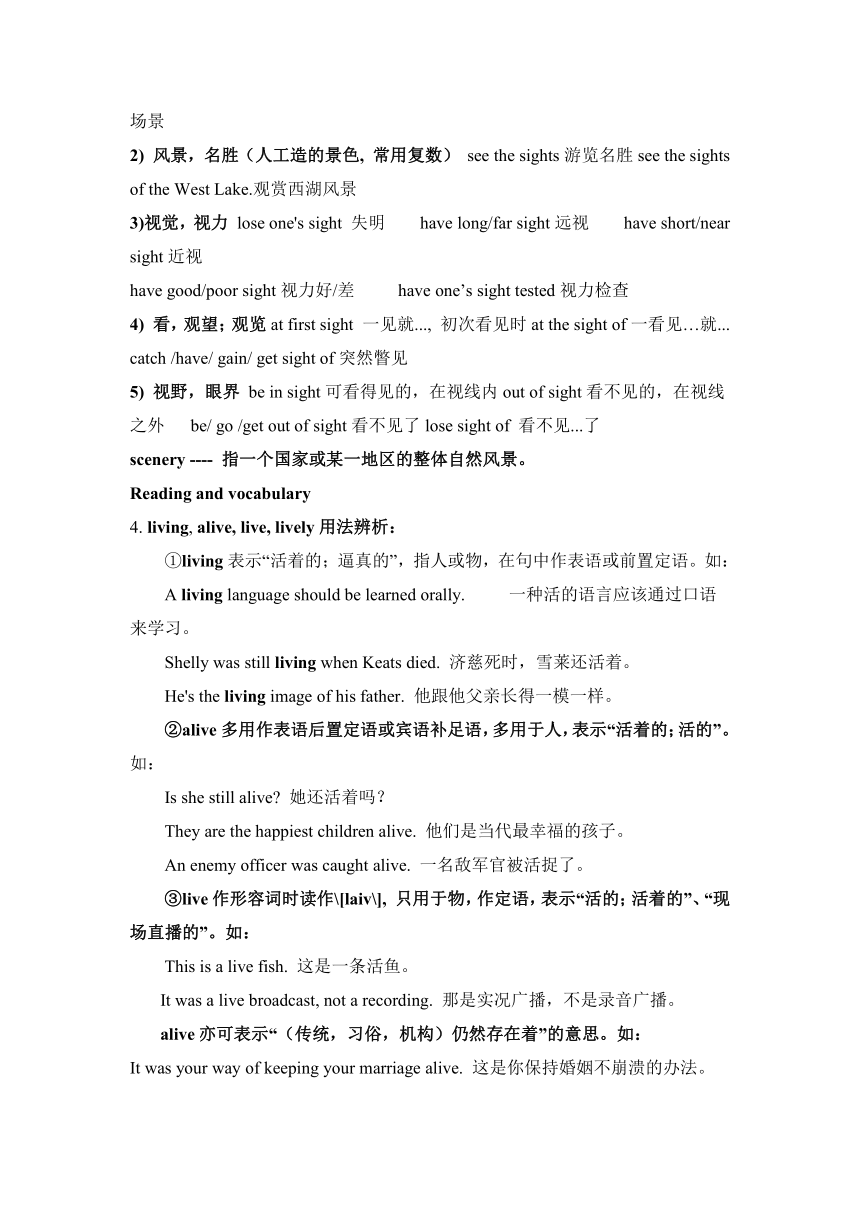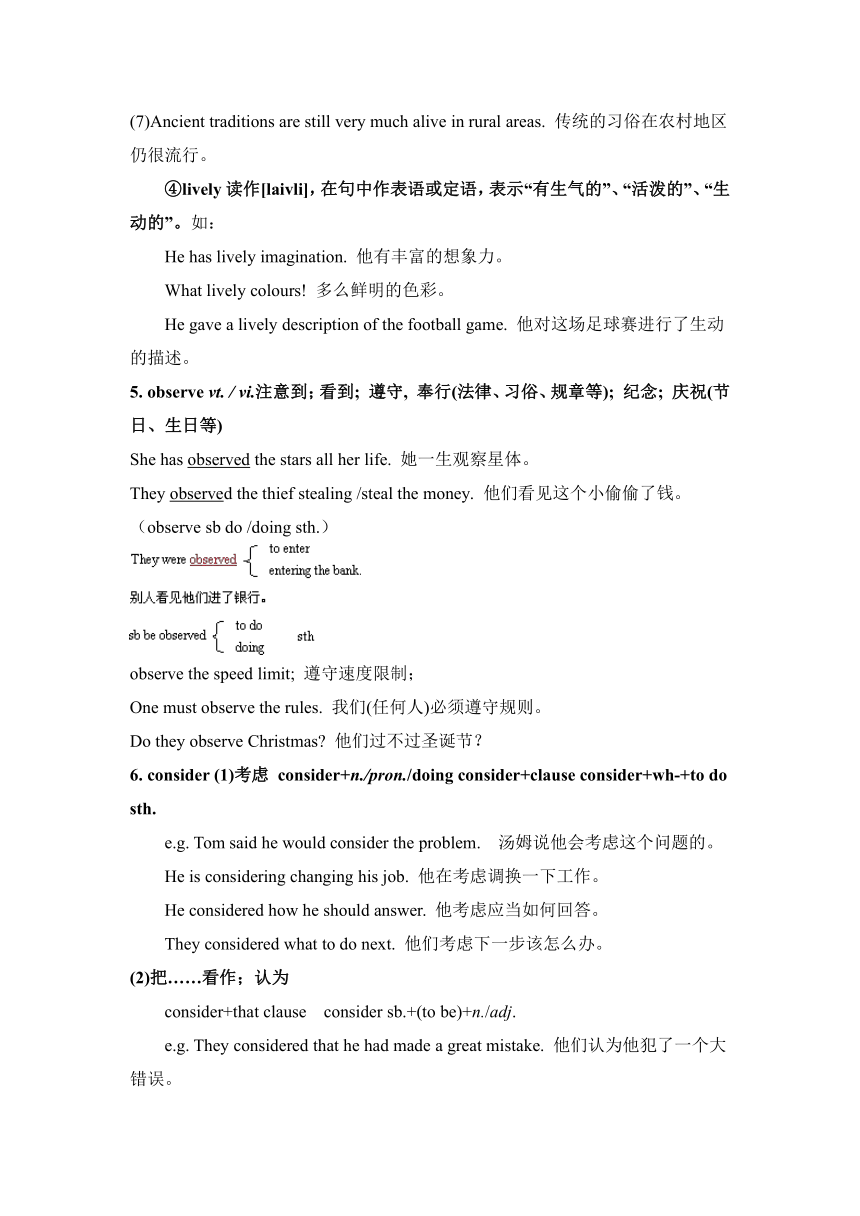辽宁省东北育才学校外研版英语必修2 Module 4 Fine Arts 教案
文档属性
| 名称 | 辽宁省东北育才学校外研版英语必修2 Module 4 Fine Arts 教案 |

|
|
| 格式 | zip | ||
| 文件大小 | 23.5KB | ||
| 资源类型 | 教案 | ||
| 版本资源 | 外研版 | ||
| 科目 | 英语 | ||
| 更新时间 | 2015-10-23 00:00:00 | ||
图片预览




文档简介
Module 4 Fine Arts-Western, Chinese and Pop Arts
知识技能目标:
学习掌握有关艺术的词汇,学习用英语表达不 ( http: / / www.21cnjy.com )同艺术作品的类型;通过讨论与描述提高学生综合运用语言能力;进一步掌握用英语表达自己喜好的句子,在描述艺术作品的过程中提高欣赏不同类型艺术作品的能力。
情感态度&价值观:
了解不同类型艺术作品以及怎样欣赏艺术作品, ( http: / / www.21cnjy.com )引导学生关心艺术,热爱艺术;创设愉快学习的课堂,让学生保持学习英语的兴趣,主动参与各种课堂活动;通过开展小组讨论,指导学生积极合作,培养其团队精神。
过程&方法:(整体模块教学思路整合)
第一步:欣赏绘画名作,让学生直接体验艺术氛围。并预习有关艺术的词汇。激活背景知识。让学生围绕art说出所能想到的词汇。
第二步:学习描述一副艺术作品。并且以艺术为话题,导入相关词汇及本模块重点语法--动词的ing形式及动词不定式。
第三步:引入课文,并深入介绍中西艺术的共同点及区别。
第四步: 分组讨论呈现,毕加索的反战思想及艺术成就。
第五步:词汇,句型,重点语法巩固练习。
第六步: 写作输出:根据主题句扩展写作。
Introduction
be interested in 对…感兴趣
Are you interested in ( http: / / www.21cnjy.com ) playing football?你对足球感兴趣吗?
引申:interested 与interesting区别
Take /have an interest in 对…有兴趣
2. prefer v.更喜欢…..
prefer sth to ( http: / / www.21cnjy.com ) sth prefer to do sth prefer doing sth; prefer doing sth to doing sth
I much prefer dogs to cats.与猫比起来,我更喜欢狗。
Many people living ( http: / / www.21cnjy.com )in cities would actually prefer to live in the country.许多住在城市的人实际上更愿意住在乡村。
Peter prefers traveling by train.彼得更喜欢乘火车旅行。
I prefer staying home to going out today.我今天宁愿呆在家里,也不愿出去。
preference n.偏好
I must admit I ha ( http: / / www.21cnjy.com )ve a preference for romantic movies.我必须承认我更喜欢浪漫电影。 .
I asked her where ( http: / / www.21cnjy.com ) she wanted to go on vacation,but she didn't express any preference.我问她想到哪儿去度假,但她没表示自己的偏好。
In allocating housing, ( http: / / www.21cnjy.com )preference is given to those who have young children.在分配房子时,那些有小孩的人有优先权。
Many people c ( http: / / www.21cnjy.com )hoose the train in preference to driving.许多人宁愿选择火车也不愿选择自己驾车。
3. scene 1)自然景色,风景
The scene is ( http: / / www.21cnjy.com ) a perfect dream when you see the sun rising slowly in the east.
2)眼前的情景,景象(包括人及活动在内)
The scene after the ( http: / / www.21cnjy.com ) earthquake was horrible.地震后的场景十分可怕。
There is a happy scene of children playing in the garden.孩子们在花园里玩耍,好一派欢乐的景象。
3)现场,出事地点a crowd at the scene of the accident在出事地点的人群
4)场所,地点What's new on the film scene 电影院演什么新片?
5)(戏剧)场景,布景
scene 与view, sight, scenery 的区别
view 1)常指从某处可以看到的 ( http: / / www.21cnjy.com )自然景色 It's a room with a view. You'll like it. There is a lovely view from this window
2)a point of view观点
scenery指某地总的自然风景或景色,尤指美丽的乡间景色。不可数 。
I hope one day I ( http: / / www.21cnjy.com )will have a long holiday and go to a far-away village to enjoy the beautiful scenery.
sight 1)景象,景物, 场景, 景观 a beautiful sight美丽的景象 a sad sight悲惨的场景
2) 风景,名胜(人工造的景色, 常用复数) see the sights游览名胜see the sights of the West Lake.观赏西湖风景
3)视觉,视力 lose one's sight 失明 have long/far sight远视 have short/near sight近视
have good/poor sight视力好/差 have one’s sight tested视力检查
4) 看,观望;观览at first sight 一见就..., 初次看见时at the sight of一看见…就... catch /have/ gain/ get sight of突然瞥见
5) 视野,眼界 be in sight可看得见的,在视线内out of sight看不见的,在视线之外 be/ go /get out of sight看不见了lose sight of 看不见...了
scenery ---- 指一个国家或某一地区的整体自然风景。
Reading and vocabulary
4. living, alive, live, lively用法辨析:
①living表示“活着的;逼真的”,指人或物,在句中作表语或前置定语。如:
A living language should be learned orally. 一种活的语言应该通过口语来学习。
Shelly was still living when Keats died. 济慈死时,雪莱还活着。
He's the living image of his father. 他跟他父亲长得一模一样。
②alive多用作表语后置定语或宾语补足语,多用于人,表示“活着的;活的”。如:
Is she still alive 她还活着吗?
They are the happiest children alive. 他们是当代最幸福的孩子。
An enemy officer was caught alive. 一名敌军官被活捉了。
③live作形容词时读作\[laiv\], 只用于物,作定语,表示“活的;活着的”、“现场直播的”。如:
This is a live fish. 这是一条活鱼。
It was a live broadcast, not a recording. 那是实况广播,不是录音广播。
alive亦可表示“(传统,习俗,机构) ( http: / / www.21cnjy.com )仍然存在着”的意思。如:
It was your way of keeping your marriage alive. 这是你保持婚姻不崩溃的办法。
(7)Ancient traditions are still very much alive in rural areas. 传统的习俗在农村地区仍很流行。
④lively读作[laivli],在句中作表语或定语,表示“有生气的”、“活泼的”、“生动的”。如:
He has lively imagination. 他有丰富的想象力。
What lively colours! 多么鲜明的色彩。
He gave a lively description of the football game. 他对这场足球赛进行了生动的描述。
5. observe vt. / vi.注意到;看到; 遵守, 奉行(法律、习俗、规章等); 纪念; 庆祝(节日、生日等)
She has observed the stars all her life. 她一生观察星体。
They observed the ( http: / / www.21cnjy.com )thief stealing /steal the money. 他们看见这个小偷偷了钱。(observe sb do /doing sth.)
observe the speed limit; 遵守速度限制;
One must observe the rules. 我们(任何人)必须遵守规则。
Do they observe Christmas 他们过不过圣诞节?
6. consider (1)考虑 c ( http: / / www.21cnjy.com )onsider+n./pron./doing consider+clause consider+wh-+to do sth.
e.g. Tom said he would consider the problem. 汤姆说他会考虑这个问题的。
He is considering changing his job. 他在考虑调换一下工作。
He considered how he should answer. 他考虑应当如何回答。
They considered what to do next. 他们考虑下一步该怎么办。
(2)把……看作;认为
consider+that clause consider sb.+(to be)+n./adj.
e.g. They considered that he had made a great mistake. 他们认为他犯了一个大错误。
We don’t consider Tom to be our best friend. 我们并不把汤姆当成我们最好的朋友。
7. with differe ( http: / / www.21cnjy.com )nt aspects of the object or person showing at the same time.
with复合结构
它的构成是:“with + 宾语 + ( http: / / www.21cnjy.com )宾语补足语”。宾语由代词、名词、名词词组充当,宾补由分词、不定式、形容词、副词、介词短语、名词等充当。
Holms and Watson sat ( http: / / www.21cnjy.com )with the light on for half an hour.福尔摩斯和沃森坐着,让灯亮了半个小时。(介词短语)
He used to sleep with the door open.他过去常开着门睡觉。(形容词)
With a boy lea ( http: / / www.21cnjy.com )ding the way,they started towards the village.由一个小男孩领着路,他们朝那个村子去了。(现在分词)
With the work done,he went home.工作做完后,他回了家。(过去分词)
With you to help us ( http: / / www.21cnjy.com ),we will finish the task in time.由你来帮助,我们将会及时完成任务。(不定式)
Hong Kong looks mor ( http: / / www.21cnjy.com )e beautiful with thou-sands of lights on at night.夜里,香港万盏灯火,分外美丽。(副词)
从以上例句可以看出:在with复合结构中 ( http: / / www.21cnjy.com ),宾语和宾补之间形成逻辑上的主谓关系。当这种主谓关系表现为主动语态时,用现在分词;当这种主谓关系表现为被动语态时,用过去分词;当这种主谓关系表示将来意义时,用不定式;当这种主谓关系表示伴随意义时,用现在分词或副词。
8. Aim n. 目的,目标 un. 瞄准 v. 力求达到,力争做到;目的是
with the aim of 以…为目标
She went to London with the aim of finding a job. 她去伦敦是为了找工作。
Our aim is to increase sales in Europe. 我们的主要目标是增加在欧洲的销售量。
take aim at 瞄准
Her aim was good and s ( http: / / www.21cnjy.com )he hit the lion with her first shot. 她瞄得准,第一枪就打中了狮子。
aim at doing (sth) 力争做到
aim to do 目标是
I aim to be a millionaire by the time I'm 35.
be aimed at 目的是,旨在
These measures are aimed at preventing violent crime. 这些措施旨在防止暴力犯罪。
aim sth at sth 瞄准;对准
I was aiming at the tree but hit the car by mistake. 我对准树射击,不料误中了汽车。
aim sth at sb 针对,对象是
The book is aimed at very young children. 这本书的对象是针对幼童。
My criticism wasn’t aimed at you. 我的批评不是针对你的。
9. He is most famous for his lively paintings of horses.
形容词最高级前面不加定冠词the表示“非常”
This is a most dif ( http: / / www.21cnjy.com )ficult book. 这是一本很难的书。(This is a very difficult book.)
10. be /get tired of 厌烦,对。。。不感兴趣。
He is tired of the ( http: / / www.21cnjy.com )same food for breakfast every morning. 他对每天都相同的早饭感到厌烦。
I'm tired of doing the same work all day long. 我讨厌每天做同样的作业。
My uncle got tired of living in the city. 我叔叔厌烦住在城里。
11. crazy adj. 疯狂的, 狂热的
She's crazy about dancing. 她热衷于跳舞。
He's crazy to drive his car so fast. 他把车开得这样快,真是疯了。
12. can’t stand(用于否定,疑问句)忍受,经受
I can’t stand his brother. 我受不了他的兄弟.
I can’t stand people interrupting all the time.我无法忍受老有人打岔
Grammar 1 动名词和动词不定式作宾语
13. 3. 不定式,动名词做宾语的区别
A.请把以下动词或词组归类
decide/determine, ca ( http: / / www.21cnjy.com )n’t stand, plan, consider, be used to, happen, wait, promise, look forward to, avoid, have difficulty/trouble in, refuse, finish, pay attention to, excuse/pardon, admit, have a good/wonderful/hard time in, choose, offer, care, manage, lead to, devote to, stick to, keep/keep on, learn, expect, hope, get down to, give up, suggest, advise, want, pretend, delay/put off, afford, insist on, escape, agree, enjoy, appreciate, miss, practice, help, ask, forbid, imagine, deny, feel like, be busy (in)
接doing的动词和词组
____________________________________________________________________________________________________________________________________________________________________________________________________________________________________
接to do的动词词组
____________________________________________________________________________________________________________________________________________________________________________________________________________________________________
B. 请说出以下动词后面to do 和doing的含义区别
a. forget/remember/regret to do /doing
b. stop to do/doing
c. try to do/doing
d. mean to do/ doing
e. go on to do/doing
f. can’t help (to) do sth. / can’t help doing
g. like / hate / prefer to do /doing
h. begin/start to do/doing
C. allow/permit/forbid/advise
D. need/want/require
E. worth, worthy, worthwhile的搭配区分
Grammar 2
14. 不定式和动名词作主语的区别:
动名词作主语通常表示抽象或已经完成的动 ( http: / / www.21cnjy.com )作;而不定式作主语表示具体或未发生的动作。 Smoking is prohibited here. It is not very good for you to smoke so much.
Climbing mountains is interesting.爬山很有趣。(经验)
Driving a car during the rush hour is tiring.在高峰时刻开车令人厌烦。(经验)
It took me only five minutes to finish the job.
cultural corner
15. agree to, agree with与agree on区别
(1)agree to意为“同意”,后面往往接计划、安排、建议、意见、条件之类的名词或动词原形,
如:Do you agree ( http: / / www.21cnjy.com ) to this arrangement / proposal 对于这个安排/建议你同意吗?He didn’t agree to her taking up the job.他不同意她担任这项工作。
(2)agree with意为“与……(意见)一致”,后面一般接人,也可接意见,看法等。
如:I don’t agree with your idea.我不同意你的主意。
Agree with sb 适合(某人的健康或胃口)
The climate there doesn't agree with him. 那里的气候对他不合适。
(3)agree on表示 ( http: / / www.21cnjy.com )“就……取得一致意见”。 如:The two sides have agreed on the date of negotiations. 双方商定了谈判的日期。
知识技能目标:
学习掌握有关艺术的词汇,学习用英语表达不 ( http: / / www.21cnjy.com )同艺术作品的类型;通过讨论与描述提高学生综合运用语言能力;进一步掌握用英语表达自己喜好的句子,在描述艺术作品的过程中提高欣赏不同类型艺术作品的能力。
情感态度&价值观:
了解不同类型艺术作品以及怎样欣赏艺术作品, ( http: / / www.21cnjy.com )引导学生关心艺术,热爱艺术;创设愉快学习的课堂,让学生保持学习英语的兴趣,主动参与各种课堂活动;通过开展小组讨论,指导学生积极合作,培养其团队精神。
过程&方法:(整体模块教学思路整合)
第一步:欣赏绘画名作,让学生直接体验艺术氛围。并预习有关艺术的词汇。激活背景知识。让学生围绕art说出所能想到的词汇。
第二步:学习描述一副艺术作品。并且以艺术为话题,导入相关词汇及本模块重点语法--动词的ing形式及动词不定式。
第三步:引入课文,并深入介绍中西艺术的共同点及区别。
第四步: 分组讨论呈现,毕加索的反战思想及艺术成就。
第五步:词汇,句型,重点语法巩固练习。
第六步: 写作输出:根据主题句扩展写作。
Introduction
be interested in 对…感兴趣
Are you interested in ( http: / / www.21cnjy.com ) playing football?你对足球感兴趣吗?
引申:interested 与interesting区别
Take /have an interest in 对…有兴趣
2. prefer v.更喜欢…..
prefer sth to ( http: / / www.21cnjy.com ) sth prefer to do sth prefer doing sth; prefer doing sth to doing sth
I much prefer dogs to cats.与猫比起来,我更喜欢狗。
Many people living ( http: / / www.21cnjy.com )in cities would actually prefer to live in the country.许多住在城市的人实际上更愿意住在乡村。
Peter prefers traveling by train.彼得更喜欢乘火车旅行。
I prefer staying home to going out today.我今天宁愿呆在家里,也不愿出去。
preference n.偏好
I must admit I ha ( http: / / www.21cnjy.com )ve a preference for romantic movies.我必须承认我更喜欢浪漫电影。 .
I asked her where ( http: / / www.21cnjy.com ) she wanted to go on vacation,but she didn't express any preference.我问她想到哪儿去度假,但她没表示自己的偏好。
In allocating housing, ( http: / / www.21cnjy.com )preference is given to those who have young children.在分配房子时,那些有小孩的人有优先权。
Many people c ( http: / / www.21cnjy.com )hoose the train in preference to driving.许多人宁愿选择火车也不愿选择自己驾车。
3. scene 1)自然景色,风景
The scene is ( http: / / www.21cnjy.com ) a perfect dream when you see the sun rising slowly in the east.
2)眼前的情景,景象(包括人及活动在内)
The scene after the ( http: / / www.21cnjy.com ) earthquake was horrible.地震后的场景十分可怕。
There is a happy scene of children playing in the garden.孩子们在花园里玩耍,好一派欢乐的景象。
3)现场,出事地点a crowd at the scene of the accident在出事地点的人群
4)场所,地点What's new on the film scene 电影院演什么新片?
5)(戏剧)场景,布景
scene 与view, sight, scenery 的区别
view 1)常指从某处可以看到的 ( http: / / www.21cnjy.com )自然景色 It's a room with a view. You'll like it. There is a lovely view from this window
2)a point of view观点
scenery指某地总的自然风景或景色,尤指美丽的乡间景色。不可数 。
I hope one day I ( http: / / www.21cnjy.com )will have a long holiday and go to a far-away village to enjoy the beautiful scenery.
sight 1)景象,景物, 场景, 景观 a beautiful sight美丽的景象 a sad sight悲惨的场景
2) 风景,名胜(人工造的景色, 常用复数) see the sights游览名胜see the sights of the West Lake.观赏西湖风景
3)视觉,视力 lose one's sight 失明 have long/far sight远视 have short/near sight近视
have good/poor sight视力好/差 have one’s sight tested视力检查
4) 看,观望;观览at first sight 一见就..., 初次看见时at the sight of一看见…就... catch /have/ gain/ get sight of突然瞥见
5) 视野,眼界 be in sight可看得见的,在视线内out of sight看不见的,在视线之外 be/ go /get out of sight看不见了lose sight of 看不见...了
scenery ---- 指一个国家或某一地区的整体自然风景。
Reading and vocabulary
4. living, alive, live, lively用法辨析:
①living表示“活着的;逼真的”,指人或物,在句中作表语或前置定语。如:
A living language should be learned orally. 一种活的语言应该通过口语来学习。
Shelly was still living when Keats died. 济慈死时,雪莱还活着。
He's the living image of his father. 他跟他父亲长得一模一样。
②alive多用作表语后置定语或宾语补足语,多用于人,表示“活着的;活的”。如:
Is she still alive 她还活着吗?
They are the happiest children alive. 他们是当代最幸福的孩子。
An enemy officer was caught alive. 一名敌军官被活捉了。
③live作形容词时读作\[laiv\], 只用于物,作定语,表示“活的;活着的”、“现场直播的”。如:
This is a live fish. 这是一条活鱼。
It was a live broadcast, not a recording. 那是实况广播,不是录音广播。
alive亦可表示“(传统,习俗,机构) ( http: / / www.21cnjy.com )仍然存在着”的意思。如:
It was your way of keeping your marriage alive. 这是你保持婚姻不崩溃的办法。
(7)Ancient traditions are still very much alive in rural areas. 传统的习俗在农村地区仍很流行。
④lively读作[laivli],在句中作表语或定语,表示“有生气的”、“活泼的”、“生动的”。如:
He has lively imagination. 他有丰富的想象力。
What lively colours! 多么鲜明的色彩。
He gave a lively description of the football game. 他对这场足球赛进行了生动的描述。
5. observe vt. / vi.注意到;看到; 遵守, 奉行(法律、习俗、规章等); 纪念; 庆祝(节日、生日等)
She has observed the stars all her life. 她一生观察星体。
They observed the ( http: / / www.21cnjy.com )thief stealing /steal the money. 他们看见这个小偷偷了钱。(observe sb do /doing sth.)
observe the speed limit; 遵守速度限制;
One must observe the rules. 我们(任何人)必须遵守规则。
Do they observe Christmas 他们过不过圣诞节?
6. consider (1)考虑 c ( http: / / www.21cnjy.com )onsider+n./pron./doing consider+clause consider+wh-+to do sth.
e.g. Tom said he would consider the problem. 汤姆说他会考虑这个问题的。
He is considering changing his job. 他在考虑调换一下工作。
He considered how he should answer. 他考虑应当如何回答。
They considered what to do next. 他们考虑下一步该怎么办。
(2)把……看作;认为
consider+that clause consider sb.+(to be)+n./adj.
e.g. They considered that he had made a great mistake. 他们认为他犯了一个大错误。
We don’t consider Tom to be our best friend. 我们并不把汤姆当成我们最好的朋友。
7. with differe ( http: / / www.21cnjy.com )nt aspects of the object or person showing at the same time.
with复合结构
它的构成是:“with + 宾语 + ( http: / / www.21cnjy.com )宾语补足语”。宾语由代词、名词、名词词组充当,宾补由分词、不定式、形容词、副词、介词短语、名词等充当。
Holms and Watson sat ( http: / / www.21cnjy.com )with the light on for half an hour.福尔摩斯和沃森坐着,让灯亮了半个小时。(介词短语)
He used to sleep with the door open.他过去常开着门睡觉。(形容词)
With a boy lea ( http: / / www.21cnjy.com )ding the way,they started towards the village.由一个小男孩领着路,他们朝那个村子去了。(现在分词)
With the work done,he went home.工作做完后,他回了家。(过去分词)
With you to help us ( http: / / www.21cnjy.com ),we will finish the task in time.由你来帮助,我们将会及时完成任务。(不定式)
Hong Kong looks mor ( http: / / www.21cnjy.com )e beautiful with thou-sands of lights on at night.夜里,香港万盏灯火,分外美丽。(副词)
从以上例句可以看出:在with复合结构中 ( http: / / www.21cnjy.com ),宾语和宾补之间形成逻辑上的主谓关系。当这种主谓关系表现为主动语态时,用现在分词;当这种主谓关系表现为被动语态时,用过去分词;当这种主谓关系表示将来意义时,用不定式;当这种主谓关系表示伴随意义时,用现在分词或副词。
8. Aim n. 目的,目标 un. 瞄准 v. 力求达到,力争做到;目的是
with the aim of 以…为目标
She went to London with the aim of finding a job. 她去伦敦是为了找工作。
Our aim is to increase sales in Europe. 我们的主要目标是增加在欧洲的销售量。
take aim at 瞄准
Her aim was good and s ( http: / / www.21cnjy.com )he hit the lion with her first shot. 她瞄得准,第一枪就打中了狮子。
aim at doing (sth) 力争做到
aim to do 目标是
I aim to be a millionaire by the time I'm 35.
be aimed at 目的是,旨在
These measures are aimed at preventing violent crime. 这些措施旨在防止暴力犯罪。
aim sth at sth 瞄准;对准
I was aiming at the tree but hit the car by mistake. 我对准树射击,不料误中了汽车。
aim sth at sb 针对,对象是
The book is aimed at very young children. 这本书的对象是针对幼童。
My criticism wasn’t aimed at you. 我的批评不是针对你的。
9. He is most famous for his lively paintings of horses.
形容词最高级前面不加定冠词the表示“非常”
This is a most dif ( http: / / www.21cnjy.com )ficult book. 这是一本很难的书。(This is a very difficult book.)
10. be /get tired of 厌烦,对。。。不感兴趣。
He is tired of the ( http: / / www.21cnjy.com )same food for breakfast every morning. 他对每天都相同的早饭感到厌烦。
I'm tired of doing the same work all day long. 我讨厌每天做同样的作业。
My uncle got tired of living in the city. 我叔叔厌烦住在城里。
11. crazy adj. 疯狂的, 狂热的
She's crazy about dancing. 她热衷于跳舞。
He's crazy to drive his car so fast. 他把车开得这样快,真是疯了。
12. can’t stand(用于否定,疑问句)忍受,经受
I can’t stand his brother. 我受不了他的兄弟.
I can’t stand people interrupting all the time.我无法忍受老有人打岔
Grammar 1 动名词和动词不定式作宾语
13. 3. 不定式,动名词做宾语的区别
A.请把以下动词或词组归类
decide/determine, ca ( http: / / www.21cnjy.com )n’t stand, plan, consider, be used to, happen, wait, promise, look forward to, avoid, have difficulty/trouble in, refuse, finish, pay attention to, excuse/pardon, admit, have a good/wonderful/hard time in, choose, offer, care, manage, lead to, devote to, stick to, keep/keep on, learn, expect, hope, get down to, give up, suggest, advise, want, pretend, delay/put off, afford, insist on, escape, agree, enjoy, appreciate, miss, practice, help, ask, forbid, imagine, deny, feel like, be busy (in)
接doing的动词和词组
____________________________________________________________________________________________________________________________________________________________________________________________________________________________________
接to do的动词词组
____________________________________________________________________________________________________________________________________________________________________________________________________________________________________
B. 请说出以下动词后面to do 和doing的含义区别
a. forget/remember/regret to do /doing
b. stop to do/doing
c. try to do/doing
d. mean to do/ doing
e. go on to do/doing
f. can’t help (to) do sth. / can’t help doing
g. like / hate / prefer to do /doing
h. begin/start to do/doing
C. allow/permit/forbid/advise
D. need/want/require
E. worth, worthy, worthwhile的搭配区分
Grammar 2
14. 不定式和动名词作主语的区别:
动名词作主语通常表示抽象或已经完成的动 ( http: / / www.21cnjy.com )作;而不定式作主语表示具体或未发生的动作。 Smoking is prohibited here. It is not very good for you to smoke so much.
Climbing mountains is interesting.爬山很有趣。(经验)
Driving a car during the rush hour is tiring.在高峰时刻开车令人厌烦。(经验)
It took me only five minutes to finish the job.
cultural corner
15. agree to, agree with与agree on区别
(1)agree to意为“同意”,后面往往接计划、安排、建议、意见、条件之类的名词或动词原形,
如:Do you agree ( http: / / www.21cnjy.com ) to this arrangement / proposal 对于这个安排/建议你同意吗?He didn’t agree to her taking up the job.他不同意她担任这项工作。
(2)agree with意为“与……(意见)一致”,后面一般接人,也可接意见,看法等。
如:I don’t agree with your idea.我不同意你的主意。
Agree with sb 适合(某人的健康或胃口)
The climate there doesn't agree with him. 那里的气候对他不合适。
(3)agree on表示 ( http: / / www.21cnjy.com )“就……取得一致意见”。 如:The two sides have agreed on the date of negotiations. 双方商定了谈判的日期。
